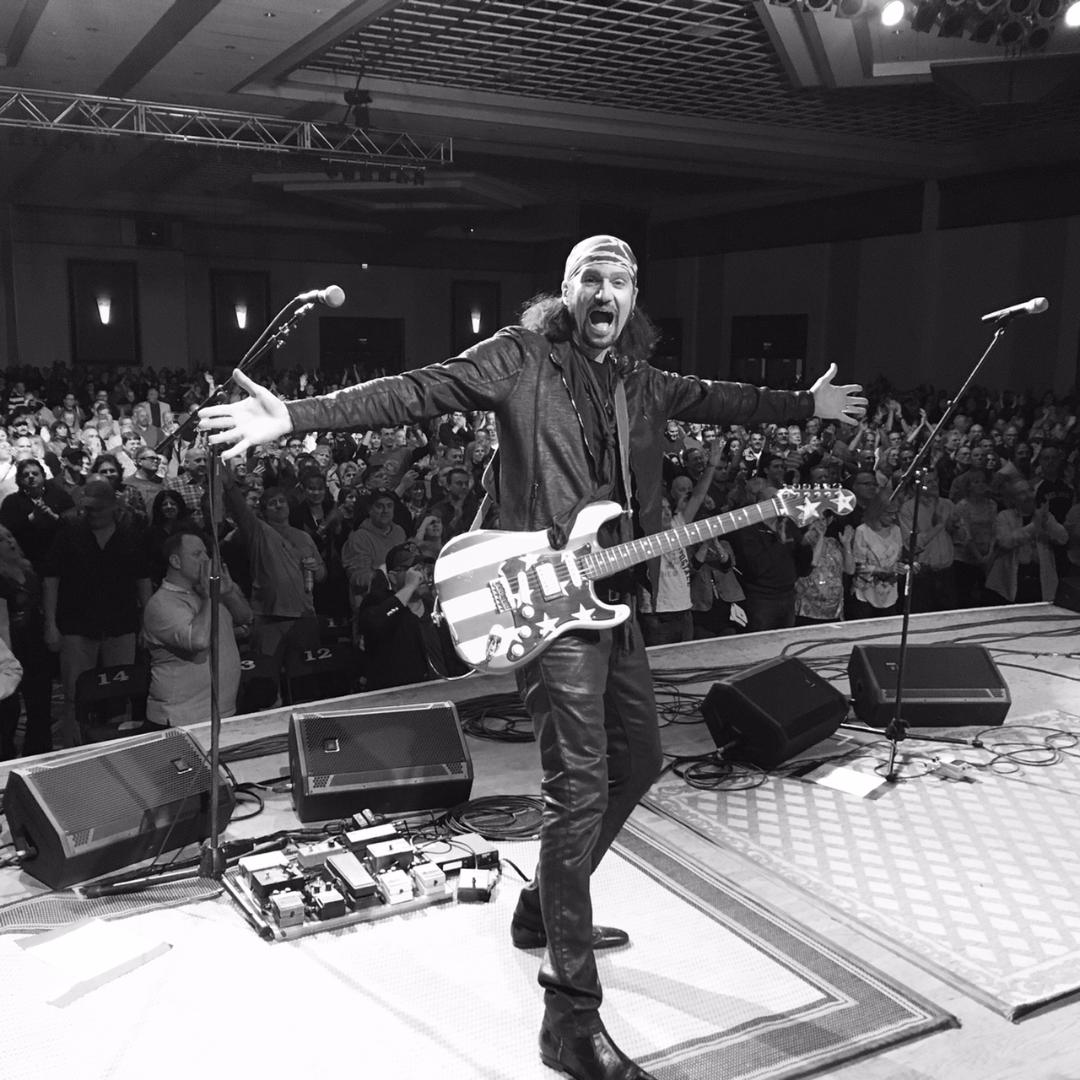
All images courtesy of Bruce Kulick
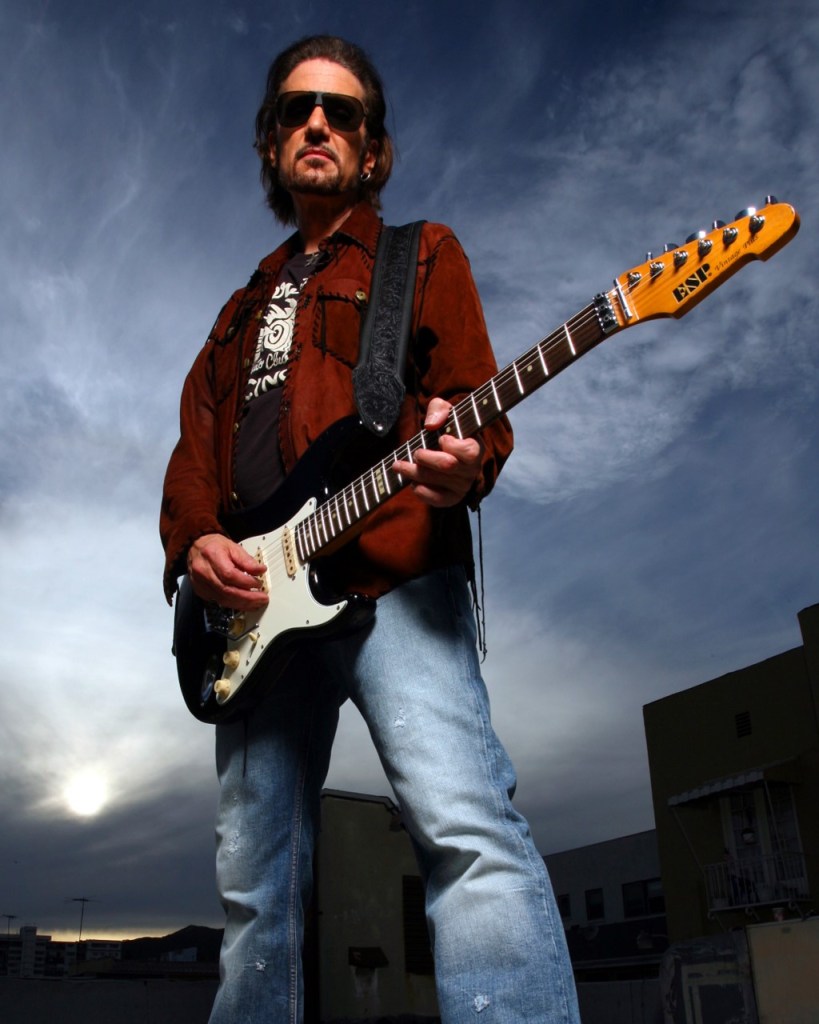
Over the course of the last year, too many of my favorite musicians have fallen prey to COVID-19. And so, if the pandemic and the massive loss of life associated with it has taught me anything, it’s to cherish the time we have. So the fact that one of my favorite, and one of the most underrated guitarists of a generation, Bruce Kulick, was able to take the time to sit down with me was not lost on me.
Those that know me are more than aware that I am a lifelong KISS fan. Like many, my indoctrination into the KISS Army came by way of the original 70s heyday. That said, I quickly discovered the band’s 80s and 90s era and grew to love it just as much as their earlier work. I’ve always had an affinity for the music of the 80s, and really if we’re honest with ourselves, who doesn’t love a little Hair Metal now and again?
When it comes to this era, some prefer the speed shredders, such as Vinnie Vincent, Mark St. John, Vito Bratta, Randy Rhoads, and more. While those players are immensely talented in their own right, and I do enjoy their work, there has always been something about Bruck Kulick’s fresh, powerful, inventive, and honest style that really stood out to me personally. Bruce’s tone and vibrato are some of the best that you will hear of the era, or of any era for that matter. The 80s and early 90s were a time of guitar god saturation, and perhaps you missed Bruce the first time around. I implore you to take a look back, and you will find that Bruce’s playing not only holds up, but it’s perhaps head and shoulders above many of his contemporaries. Simply put, a player, such as Bruce Kulick, will never go out of style, and his timeless versatility will keep him at the forefront of the instrument for as long as he chooses.
I had the chance to speak with Bruce in the fall of 2020, an interview where we mostly focused on his time with KISS. This time around, I really wanted to dive into the rest of Bruce’s distinguished career in Rock. Among other things, we touched on KKB, sharing the stage with his brother Bob while touring with Meat Loaf, his time with Blackjack, Good Rats, the immensely underrated Union, how he came to be in Grand Funk Railroad, and of course, we snuck some KISS talk in there too.
It was my pleasure to chat with Bruce, and if you would like to learn more about Bruce and hear all the latest news regarding upcoming tours, the just-announced reissues of Union and The Blue Room on vinyl, and more, head over to Bruce’s website and dig in. You can also catch Bruce on Twitter, Instagram, and Facebook. Enjoy this interview with a true Rock and roll warrior, Bruce Kulick.
Andrew:
Hey Bruce, how are you holding up? Regarding COVID, it looks like there might be a light at the end of the tunnel.
Bruce:
Yeah, I got my vaccines, and hopefully, everybody will. But either way, I’m holding up incredibly well because I’ve reinvented many things that I didn’t have time previously to work on, and in some ways, those things have broadened my career. So, I’ve made a silver lining of it and improved certain things, some of my own skills, and some of my connections with my fans. So as much as there’s the horror of it, and we all know what that is, I’m just saying personally, in the sense of growth, for me, it’s been a growth curve.
Andrew:
I’ve seen that you’ve been posting a lot of really cool videos, sort of flashback things. I’ve really been following and enjoying them. That’s definitely been a really cool thing to see. So I wanted to dive into the other parts of your career, outside of KISS before and after, things that don’t get as much attention. Maybe things specifically before KISS obviously probably ended up shaping your work within KISS, so I wanted to dig into those. So the first one I wanted to dig into, and I actually have a copy of this record; I think it’s a bootleg or something. Take me through your beginnings with KKB.
Bruce:
I don’t think it’s a bootleg, actually. And that would be funny if they did bootleg it, but that’s cool that you did get to hear it [KKB].
Andrew:
I bought it about five or six years ago, and I listened to it then, and I popped it on again a few months ago. It’s really cool. It’s sort of like early Cream, maybe Blue Cheer, kind of late 60s, early 70s power trio kind of thing.
Bruce:
Did you get it on CD, or did you actually get it on vinyl?
Andrew:
I have the vinyl record. I got it in a local store, and I’ve never seen it anywhere else before or after.
Bruce:
It’s very limited. With the vinyl, there was a German company that licensed it. So don’t lose that. I might have only a few copies myself. So, KKB was never a band with an actual name. The initials [KKB] stand for Kulick, Katz, and Bois. The three of us had a real love for bands, as you mentioned—certainly Cream and even Progressive groups like Yes, King Crimson, and things like that. Mike [Katz] was really a very talented guy. Mike had this super talent; he was a really strong singer, loved Cream so much that he could do like a really good imitation of Jack Bruce, and Jack Bruce is one of my heroes. So obviously, meeting Mike, who lived on the building next to me in Queens, was pretty remarkable. Mike could write music, and he knew how to help orchestrate music as well. Meaning he knew what to tell a drummer, what to tell me the counterpart lead guitars or rhythm parts. I was a sponge always around people that I felt were better than me or just had a vision, that’s for sure. Back then, there was no Internet then to study anybody. It was primitive. So the people you jammed with if they can teach you something and they know something, and you can work with that, that’s going to be really, really cool.
So I hit it off well with him and ended up working with him as the guitar player. I loved Eric Clapton. So I was going to be the Eric Clapton to his Jack Bruce. Right. Now the drummer [Guy Bois] was very much into the right kind of music as well. So the three of us just really gelled together with Mike’s material. And I have to admit that KKB, without it, ever have a name and never doing a gig; we were smart enough to record it, you know? I mean, we went into the studio, and then we had this terrific effort from us that just sat around and did nothing, and then many years later I continued being friends with Mike, and then at some point I kind of thought, “Wow, why don’t I put this out?” So the record that you have, that vinyl, is actually taken from the original CD I released. It was limited. I don’t know how many. Maybe only five hundred or three hundred even. And that was fun to put out and share as my first band kind of thing.
So, Mike and I kept in touch, and years later, all of a sudden, Mike finds the original tapes. What I mean by the original tapes are the actual multi-tracks. So then he says, “Hey, we can even remix this.” I said, “Look, I already put it out, and it would only make sense if we could do something new as well.” So that one is another version that’s out there, and that’s also out of print. And that one has a kind of more psychedelic orange cover, and that’s called Got to Get Back. That one, I don’t have any more of the physical product except for a couple of examples to keep for me. And then we did a new song called “Got to Get Back,” hence the name. We didn’t add anything to the tracks because those mixes were good, but it was really interesting to have a fresh take on the tracks and have a good friend of mine who’s very talented mix it again. It’s not radically different, but what you have is still representative of what that band was, and it was pretty cool.
I still own the guitar that I recorded with. Mike still has the bass that he recorded with. Sadly, probably within a year after we put out the orange version, Guy [Bois] passed away. He was dealing with some sort of cancer thing. He was over in France for many years, but I did get to see him. He was in L.A. with his girlfriend, we hooked up, and it was really amazing. I mean, I have pictures of all of us; we used to hang out sometimes. So it’s pretty interesting, but I’m real proud of that stuff. I think some of the KISS fans kind of got it. But again, I just did it as a limited thing. But it is out there.
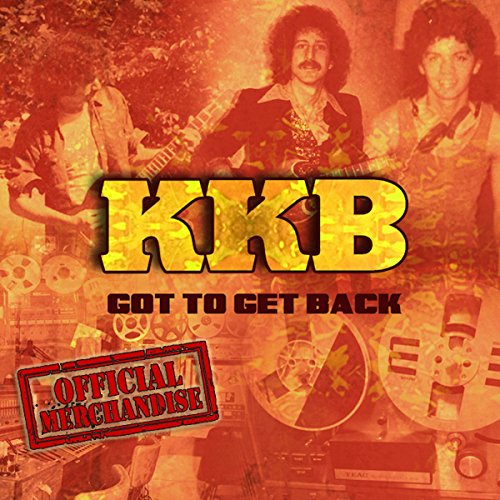
Andrew:
It is an excellent record. I remember we went into the record store, and I was like, “What is this?” I didn’t even know about it at that time. So I grabbed it and went home and was like, “Wow, this is great.” For your first record, it’s not a bad way to kick it off.
Bruce:
I know. Exactly. And I’m sure the vinyl wasn’t that cheap because if I remember, it was an import.
Andrew:
I don’t think the owner of the shop knew what it was. He knew it was Bruce Kulick, but I don’t think he knew how rare it was. I think I got it for maybe twenty-five bucks.
Bruce:
Wow. That was a steal because I think even if I were buying them, they would have cost me like forty dollars or thirty-five dollars.
Andrew:
Oh yeah. I came to find out pretty quickly; I was like, “Wow, this I got a good deal on this one.” So, I wanted to move on to Meat Loaf. I think a lot of people know that your brother [Bob Kulick] played with Meat Loaf; he played lead and rhythm. I don’t think many people realize that you also played with Meat Loaf. And now this is where I’m not sure how it played out, so help me out. I’ve heard that you guys sort of shared the lead and the rhythm work on the Bat Out of Hell Tour. What was the breakdown like on that?
Bruce:
So, the actual album Bat Out of Hell had Todd Rundgren playing guitar. After the album came out, we did the very long Bat Out of Hell Tour. That was in ’77 and ’78. There is a couple of tracks that are out there, not that easy to find anymore, but back when CDs were remastered and released, they added a couple of live tracks, and one was the intro song, which is something [Jim] Steinmann came up with that was like a sequel to “Great Balls of Fire,’ but it was really a bolero rip off. So, they ended up putting it out, and then we go into “Bat Out of Hell,” and that’s my brother and me. I’m on the left, Bob’s on the right, and there is a bit of a stereo image happening. But there are no other recordings of us. Unless you watched on YouTube, where I think there is a show from Germany, but the mix is terrible. I’m like missing half of the show or something. So, there is the concert in Germany, and also the recording of Saturday Night Live we were both on. That was with John Belushi and Gilda Radner. Christopher Lee is the host, actually.
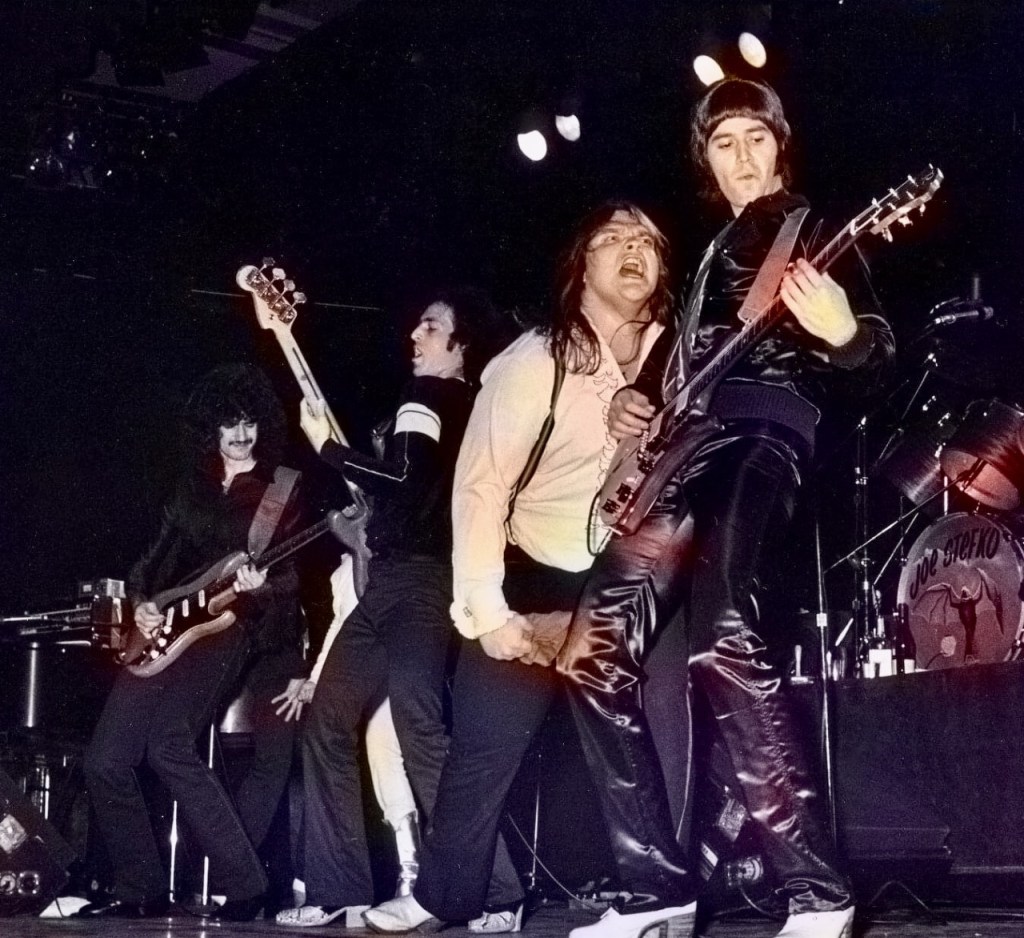
Andrew:
So, tell me more about the Bat Out of Hell Tour. What was it like sharing the stage with your brother [Bob Kulick]?
Bruce:
So, Bob and I shared rhythm and lead. We would do harmony leads. We’d switch off on the parts. Meat Loaf and [Jim] Steinmann really wanted something like that, Dick Wagner, Steve Hunter; the thing that Alice Cooper and Lou Reed had. That was a real inspiration for Bob and me. We figured, if we’re going to do something together, it would be like a Thin Lizzy thing, where they had stereo lead guitar guys, and it worked out perfect for what we needed. It was kind of funny, too, because they weren’t so sure about me when we auditioned. They love my brother, and he was very confident, cocky, and came in like that. And you know, he was already doing session work in New York, and people knew him. And I’m the younger brother, almost four years younger, but they weren’t so sure about me. And then Bob stuck up for me and said, “Well, you know, I’m not doing it without my brother.” So they agreed. I mean, it’s not that they didn’t think I could play, but I just think they thought I was a little too shy or something. I’m not sure. But I also know, even though my brother did me a favor and got me the gig, he also knew that for certain songs, they’re going to want the Todd Rundgren solo to be as close as possible, and I was much more of a guitar player that could copy somebody more than my brother. I had a good ear for picking out the riffs and studying them and committing them to memory, and it worked out really great. I remember after the manager saw us finally going in to rehearse, he came over and thanked me for working out the riffs properly. So it all worked out, and that was one long year of touring. It wasn’t easy.
Andrew:
It must have been a pretty cool thing to see the Kulick brothers playing together like that. It didn’t happen very often. It’s an interesting point you make that you are pretty astute at picking licks up because, with KISS, I always felt like you made those songs your own in a way. For example, with songs like “Deuce” or “Parasite” on the Revenge Tour, you hear those classic tracks, but what I always loved the most about your playing was that you made them your own while still staying true to the song.
Bruce:
Thanks. I’ll be honest, and I was talking about it with my wife this morning, I wasn’t told when I got to the KISS gig to copy or be exact, but I was always a fan of being sure the signature riffs were covered and to know how to interpret them and make it my own. So they got the right guy. And those Meat Loaf songs, I wasn’t somebody famous to come in and say, “No, I want to do it my way.” I’ve seen other people interpret those riffs because now my brother carried on and stayed, and he certainly didn’t do any of it any injustice, but I was like, “Oh, my God. There’s Todd Rundgren. The solo is amazing. I’m going to try to get it 95 percent right.” That was me. I joined KISS in the 80s when the guitar playing was different, and they weren’t in makeup, so I wasn’t playing the Space Ace role, you know? So I had a lot more leeway with what I could do.
Andrew:
Makes sense. So from there, we have Blackjack. So, the timeline is a little tough for me. I know Blackjack’s first record came out in ’79. But then you also recorded with Billy Squier in; I think, 1980. And there’s also another project with Rosetta, and I think that was in 1980 too. So, I know Blackjack predates that, but I’m not entirely sure how the Billy Squier and Rosetta records fit into the puzzle. I’ve also heard that you may have been offered to be a part of another Billy Squier record, but you stayed with Blackjack, right?
Bruce:
It’s hard to remember chronologically for me too. Certainly, Meat Loaf came first, and you know, set up the hope to get something more Rock ‘N’ Roll. So, when Michael Bolton got a record deal as a solo artist, all the business people really wanted to work with him, and they were powerful and could easily get you a big record deal. Well, all of them wanted him to be in a band. So Michael actually reached out to both Bob and me, and then when the business end was being looked at, how everyone would be paid and what’s involved, Bob was not that happy with some of it. Meanwhile, I thought it was the best opportunity in the world. So, exit stage, right for my brother, I step in. Could we do it as just the four-piece with Michael and then tour with a keyboard player? Sure. So that’s what happened with Blackjack, and that was ’79 and then ’80.
Now, there was a period of time before the second Blackjack record [Worlds Apart] was recorded. I got involved with Billy Squire at that point. So, that was the first of a couple of several records I did at Levon Helm Studio in Woodstock. It was up there, and it was an unusual kind of studio. Billy was the first to use it because Eddie Ashford was engineering there, and honestly, it was great to work with Billy. I learned so much. We did some of his iconic songs, although The Tale of The Tape was this big record, right? I know Eddie Trunk always talks about that Billy Squier album. And then we [Blackjack] had to do our second record [Worlds Apart], Michael and I, and we finished that one in the same studio.
Now, Rosetta also used that studio, and chronologically, I’m maybe getting them all mixed up, but it doesn’t matter. All three were done over the course of about a year and a half, and I was up in Woodstock, which was real trippy, being a New York hippy when I grew up. I thought that was kind of cool. But either way, the record didn’t really go anywhere, although there’s some talk of her [Rosetta] redoing something and putting it out. I still keep in touch with her after all these years. She introduced me to some really talented people at the time who were just young people getting in the business, and they turn on to work with famous fusion artists because they were really talented guys from Juilliard and stuff like that.
So, I remember Billy [Squire] asked me to go on the road with him, and that was to support Tale of The Tape. And that’s when Michael Bolton and we thought the second Blackjack record would get tour support; we’d be able to go back on the road. And that was a record that would be called Worlds Apart, but at the time it came out, everybody who signed at the label had been fired. That was not good. Did we get the tour support money? No. Did I pass up the tour with Billy Squier for nothing? Yes. And that kind of hurt. But honestly, ironically enough, if I would have stayed on to do the Billy thing, I might not have gotten the offer to help out KISS and to be in KISS. So it’s always a little weird how things work out.
But yeah, there was a period of time where all those things were happening, and it was exciting to be involved with. Nobody really knows the Rosetta record, but the Billy Squire thing is big. The second Blackjack album didn’t do anything great, but I have a Kanye West record over there on the wall. And that’s because he sampled it. What can I say? Other than that, it was an interesting period of time, always growing with my career and playing my guitar. I love it when I find old pictures from that era. It’s always amazing to me.
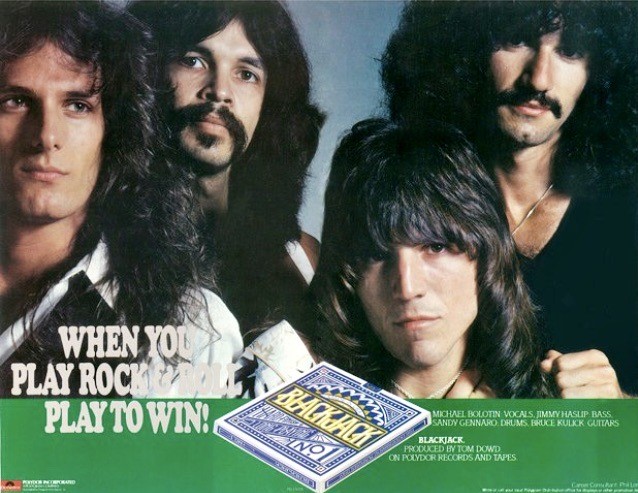
Andrew:
I really like Blackjack a lot. The late 70s and early 80s were loaded with a lot of these amazing forgotten bands, and they’re definitely one of them. It’s a cool band. And the members of that band went on to do a lot of incredible things. I’m pretty sure Sandy Gennaro replaced Tommy Aldridge in Pat Travers Band and also played with the Yellow Jackets. And, of course, we know what Michael Bolton did, his own solo career. So after all of that, you also did an album with Good Rats. Tell me more about that.
Bruce:
I joined the Good Rats when Blackjack wasn’t going to happen, and I wasn’t going on the road with Billy [Squire]. I had passed on Billy for Blackjack, and that wasn’t going to happen, so now I needed a gig. Joe Franco, who I knew about, and I knew that they [Good Rats] were a local. I lived in Queens, and they were a Long Island band. So, recently I did a pretty in-depth interview, too, of my resume, and I left out Good Rats. And some people are saying, “What about the Good Rats?” You know, it’s kind of funny because it’s not out of me having an opinion that’s negative about them. It’s just, again, because they were locally more famous and known, even though it’s bizarre. I joined KISS in ’84, and I did dates in Europe, and then I wind up hanging out with some friends in France towards the end of the tour. And a friend of mine that I met earlier when I did a record there was just like all he wants to talk to me about is the Good Rats. [Laughs]. So that’s what he wanted to talk to me about. He didn’t care that I got the KISS gig, just the Good Rats.
So, you know, I occasionally even get a Cameo request. One of those shout-outs at things. Fans always will say to me, “You’ve got to play something from the Good Rats.” [Laughs]. All of that being said, I did do a record with them. I found out or was reminded again that there was even another record that we were working on that never got released. Some of the songs they put out were sort of leftover tidbits or something. Anyway, that record was done at Electric Lady Studios, and even my brother helped out. But it’s really hard for me to put all the pieces together with that because, I mean, it was never released. I don’t have it in my hands. I have the digital files now. Another friend of mine, fortunately, has it and shared it with me. But with Good Rats, what actually happened was the original guitar player wanted to leave. He got tired of it, and then the bass player decided to leave. So we got this really great guy, Schuyler Deale, who went on to work with Billy Joel and Michael Bolton years later to play bass guitar. We got to hang out, and we just we would do like two or three gigs, a weekend playing, and all these crazy bars around the Long Island and the tri-state area. And some of them were really cool. There were a few great radio events that were really big; there is even one on YouTube. We were a big part of a WBAB event, which was a famous radio station. I’m on the bill, I think. Joan Jett might have been on the bill, and Rick Derringer too. I’m very proud of any of the stuff I see from that era. I’m playing really tight. You know, I’m into it.
And then I eventually left the Good Rats in ’83 because then Michael [Bolton] changed his name, rebranded himself, and was on MTV. He does a record called Fool’s Game, and it starts to take off a little bit, and he’s going to go tour. And I played a little bit on that record, not not the entire album, but a couple of songs. So, the next thing I know, we’re on tour with Bob Seger, who had Don Brewer playing drums at the time. So here’s the connection with Grand Funk many years later, if you get what I mean. So everything gets interconnected. And it is very, very fascinating to me looking back, and even though sometimes I get a little confused with the chronological timeline, it all makes sense how one thing led to another. It’s connected to this or that, even if it reappears years later, how it all came about.
Andrew:
So you did all of that, and it’s the 80s now, and we know that you joined KISS. So the interesting thing about guitar in the 80s is while I’ve always loved guitar, and the shredders are great, you were a different sort of animal. In an era where it was all shredders, you played with so much feel and a very distinctive tone. Especially on Crazy Nights, I thought your tone was incredible on that record. How did it all come together for you to shape the style that we came to see from you? I guess there’s an argument to made that you “came into your own with KISS, but in my opinion, you were always there, and so was the talent; it was a matter of you finally being revealed to the masses on a larger scale.
Bruce:
Well, I had a great platform to explore with a terrific band that had exposure and fame. Being in KISS can give you quite a bit of that exposure. You know, the only thing that I really embraced and learned and then adapted to fit was some of the techniques that Eddie Van Halen was popular for. I never liked it, and I never could do some of the techniques of shredding. OK, so let’s say and again, we’re just talking adjectives like Yngwie [Malmsteen] is a tremendous player, and I love his byproduct, and of course, he’s wanting to emulate players that are classically trained. The same thing with Randy Rhodes, in a way. You know, Eddie [Van Halen] had the fire and the vibe of an Eric Clapton but rolled up into a Pontiac GTO with a supercharger or something, some sort of muscle car. Sure, he’s one of those hammer-ons, finger-tapping guys, but his vibrato is still very much on track. And his approach to playing was not always about how many notes. It was about what you do with the notes. So he became, for me, the best hero to incorporate some techniques that I didn’t know before. Hendrix didn’t use them. Clapton didn’t use them. Jimmy Page didn’t use them. But I would take some of those things from Eddie, and that became important in my KISS years.
So I think in a way, the way you were describing me, I did change a little during those years and probably for the better to be more appropriate for that era. But I still did it from the foundation of the guys I really loved. Again, Eric Clapton, Jimi Hendrix, Jimmy Page, and Jeff Beck, but then adding some of the stuff that Eddie really made famous that turned the Rock guitar upside down. That said, as a player generally, if I adapt something, even where I became my flashiest, let’s say, on Revenge or Carnival of Souls, there are still elements of my foundation in there. So, thank you for the way you described what you heard from me. And I was envious. There were some guys, Steve [Vai]. I was always like, “Oh, my God, what the hell is he doing? He’s an alien.” I was never a real fusion guy, even though I like Jazz, and I really admired Jazz players. I just think I kind of adapted what works for me. I can’t do sweep picking and some of the other crazy things that shredders do. I see plenty of these guys that can fly up and down the neck, and I can’t do that. But neither does Brian May. It’s OK if you can’t do it; you just don’t use it.
Andrew:
I always found you’re playing to be very musical and memorable, in all the best ways. When I think of some of my favorite guitar albums ever, I always think of Crazy Nights. I think that your guitar work on that album is incredible
Bruce:
You know, [Ron] Nevison produced me, and we did the best with the leads that we could. He also made sure that the lead guitar was featured, even though that album has keyboards that some people pick on. When I come in, it’s screaming, hot guitars like, “Look at me, I’m center stage, big spotlight on me, and my solo is right there.” So for that reason, I really did like Crazy Nights. Besides the fact that I think it was a strong record. And, you know, with the KISS fans, some love Asylum, some love Carnival of Souls. You know what I mean?
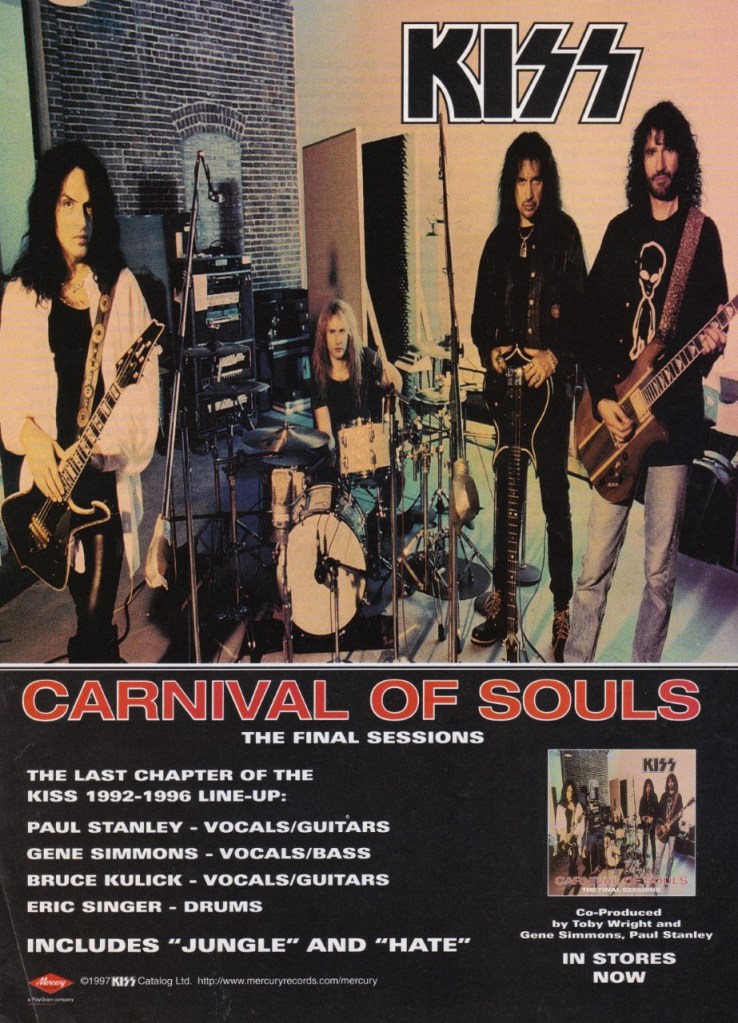
Andrew:
Carnival of Souls is an important and overlooked record in KISStory. And this is particularly relevant when speaking about your influence. I felt like maybe Gene and Paul were not so focused on it at that point with the talks of the Reunion Tour behind the scenes. It seems like you really exerted your influence on that record more so than maybe ever before. I feel that way because of what you did in Union afterward. Just today, I had the first Union album on in my car, and as I’m listening to it, it really dawned on me that musically it is really reminiscent of Carnival of Souls. So, my question is, was your true musical self manifesting and coming out with Carnival of Souls and then onward with Union?
Bruce:
That’s a great question, and I see how you would connect the dots that way. But actually, it was more to do with Revenge. So, we did the Revenge Tour and recorded Alive III, which is a terrific record. But it didn’t do as well as we would have hoped, especially with Ezrin producing a movie song “God Gave Rock ‘n’ Roll To You II.” I feel that music was really changing at the time, and it was getting darker and grungier. We know this, and I think that Gene was really embracing that stuff quite a bit. He liked some of that darkness that some of those bands had. He was attracted to the drop-D tuning and all those things, but Paul was not so sure. He was not a big fan of flannel shirts and all that. [Laughs]. So when we started to work on songs and this had nothing to do with the Reunion Tour, Gene was the one that was really writing and being creative and working on stuff, and I worked a lot with Gene. Eric [Singer] would be involved, and we would jam in these kinds of funky studios and come out of there with ideas. Some actually did make it to Carnival of Souls, and some wound up on Psycho Circus like “Within.”
As we know, the record didn’t come out until after MTV Unplugged and the Reunion Tour, but a lot of the material was written before MTV Unplugged, but to make money and for the band to maybe connect the dots with the past, the Convention Tour started as a brainchild from them wanting some to be in on that action. They figured, “Well, we’ll do one, and we’ll show the costumes, and we’ll perform, and we’ll charge one hundred dollars.” And let me tell you, back then, a hundred dollars was, like, ridiculous. Of course, most of them sold out. A few didn’t do very well. We canceled a few. Looking back, think about what they got for one hundred dollars. It’s unbelievable. But then the MTV Unplugged thing did force the opportunity for business people to come up and offer Ace, Peter, Gene, and Paul the deal. Obviously, they were going to go into makeup, and that all was ironed out and figured out post-MTV. So, with Carnival of Souls, we already had a lot done, and Paul knew he had to come up with some songs, and he did lean on me because he wasn’t that motivated with that kind of music. But he still came up with some great things. I love equally what I helped contribute to both of them. And of course, we choose Toby Wright to produce, who’s a wonderful guy and worked with Alice in Chains but knew the KISS history, but still tried to push that narrative of a darker, meaner, weirder record, rightly or wrongly.
I see what you’re saying when you say I must have co-written a lot because Gene and Paul’s focus was elsewhere. Yes and no, but it was also the times. And yes, once we got the studio, yeah, their focus got a little, you know, distracted with all these meetings. And then, all of a sudden, of course, we went in late November, and then by January, they had to tell Eric Singer and me that they were going to do the Reunion Tour but that we were going to finish the album. It was kind of weird when that was going on. I knew something was up when I couldn’t get Gene to commit. I was asking him, “When are we going to record?” And then, all of a sudden, he would say, “You’re right, I’ll get back to you.” You know, I mean, it’s like since when do I have to remind them to go record? And we were already kind of committed because the record company got the songs, but looking back, I get the overall picture. They’re were going to move into this thing. I can’t even imagine how hard it was for them to wrangle the contracts where they could be to make it work. But they did make it work, and the rest is history, as we know. And they stayed in makeup. And then, of course, they knew with Ace and Peter that it wasn’t going to be forever. We know that. But with Carnival of Souls, I was working really hard when they were looking for riffs. I kept jamming to my drum machine. I d-tuned the guitar. I got creative, and I’d say, “Paul, what do you think of this?” He would say, “Oh, that’s cool.” I started working with a guy that Paul liked, this guy, Curtis Cuomo. And the next thing I know, we’re presenting some really cool ideas to him [Paul]. And then he jumped right in, and he came up with “Master and Slave,” but he’s missing a bridge. So I jump in, and Curtis is working on some melodies with Paul. So hence I wind up with nine co-writes on an album that almost never came out, as you know.
Andrew:
It was a great album for sure. So, Union is another band that I feel was really great and so underrated. I can’t remember when Vince Neil returned to Mötley Crüe, but I know John Corabi had just left. No, the last time we spoke, you alluded to the fact that both yourself and John [Corabi] had just come out of these two successful bands due to reunions. And so you guys found common ground there. Take me through how Union came together beyond that.
Bruce:
Well, once the Reunion Tour was over, it was obvious Gene and Paul weren’t going back, and I had to announce to the world that I wasn’t going to be in KISS anymore because that tour was so successful. So I remember one of the first people I reached out to was Larry Mazer, a manager who worked with the band during Hot in the Shade. I liked Larry a lot, and Larry wasn’t involved with the Reunion Tour; they moved over to Doc McGhee after having a meeting with whoever they felt they wanted to experiment with. And they’re still with Doc. How do you like that? Anyway, Larry loved John [Corabi], and John knew him. I knew of John; I remember his ex-wife Valerie used to cut my hair back in the Sunset Strip at one of the salons. So, John and I hooked up, and we hit it off really well as much as we’re different personalities and everything, I always really respected John’s talent. And then we started to work on some songs, and there was definitely chemistry there.
But now, the kind of music we wanted to do wasn’t going to be a major label, but there were strong indie labels that could give you some reasonable money to record. And then obviously, if you really started to take off, the major label comes in. So we got a deal with this label called Mayhem. So we brought in Brent Fitz to play drums and Jamie Hunting to play bass. We didn’t have a name in the beginning, but we started to record, and then we came up with the name Union, and we did the first self-titled album. And quite honestly, I’m still very proud of everything on that record. I love the Blue Room as well. There could be some really exciting news coming up soon that that will actually finally work with some people who are able to license it and put out a vinyl version of it. I just found out about that today, and it’s not set in stone, but maybe by the time you publish, it will be. So I’ve been working on that. Not me personally, but I gave the green light for some people to work on it for the past six months. Sometimes you have to be patient for it.
So anyway, two great records. I’m still tight with John; we’ve done a few things together, even when the band disbanded and everything we worked with Eric Singer in E.S.P., but it would be great, of course, if the vinyl can come out and to see a lot more enthusiasm for it. I’m planning on posting more things on Facebook regarding Union. So I’m going to start embracing it. I love going back.
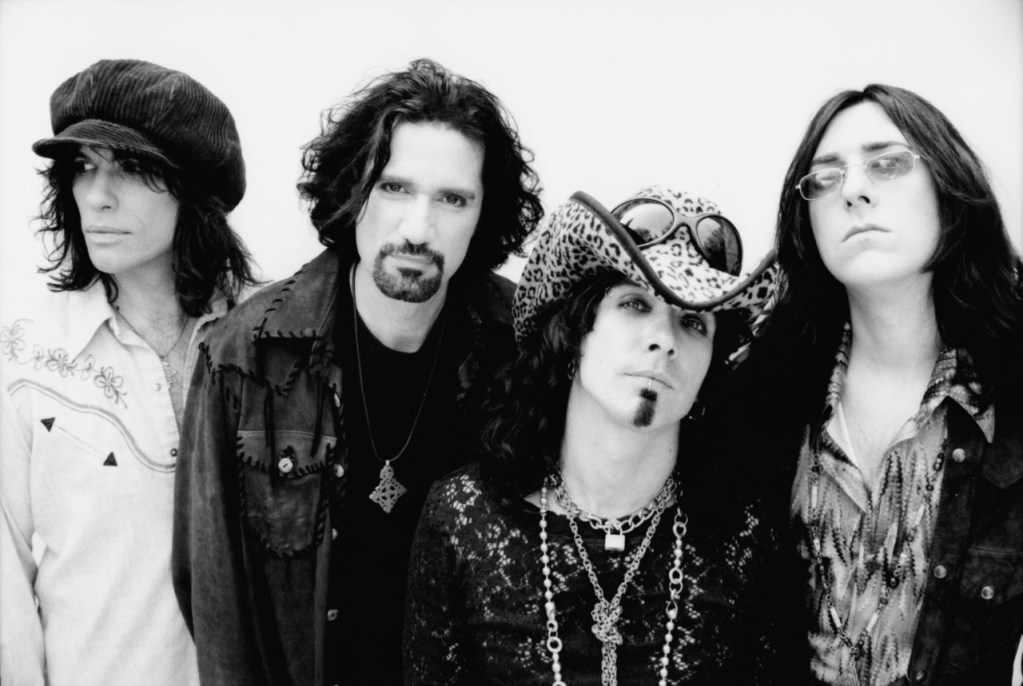
Andrew:
Union was such a good band. I’m such a fan of your post-KISS work, Union, E.S.P., and then your solo records. There’s some fierce and vicious guitar playing on those records. Regarding E.S.P., I know that was Eric Singer’s project after KISS. Take me through a little bit of your history with E.S.P. because that doesn’t get much recognition.
Bruce:
I want to mention one thing about Union. It’s kind of funny. I hope people out there will understand. I was always really proud of that group, but I was always very in some ways. I wouldn’t say hurt, but extremely frustrated with it. Every time we tried to take a step forward, we wound up going back two steps. Every triumph would turn into something weird. And I’m hoping that in retrospect, now people can give it a fresh listen and really enjoy it and embrace it. Because my wife just recently mentioned, “You know, whenever you talk about Union, you get really cranky.” But she knows why, though, because it’s just been a source of frustration because I loved all the guys in the band, and I love the music with it.
Now, E.S.P, ironically enough, when Eric was either slow with his gig with KISS or during one of those years where Peter was back in KISS, I don’t remember. All of a sudden, he’s like, “I want to do a covers record. I got a buddy to fund it,” who’s still a very close friend of mine, too. And he wanted to use Karl Cochran, a really talented guitar player that I forget how Eric even knew him, who could also play bass guitar. He sang and said, “Let’s use John [Corabi] because you’re working with John sometimes.” I always think Eric was didn’t understand why I didn’t ask him to be in Union with me. I didn’t think he wanted to be in Union. [Laughs]. We were going to have to struggle from nowhere. And then John and I used to have to deal with like, “Oh, they’re the KISS and Mötley Crüe guys,” you know what I mean? But it’s kind of ironic that years later, I think Eric actually even said, “How come you didn’t ask me.” And there was an occasion when Union was touring where I had to use Eric in Japan or something. They were just weird things because Brent [Fitz] couldn’t do it, you know, for a tour in Europe, just short things.
Anyway, E.S.P was just going to be a fun covers band album. But we chose deep tracks, and we hit it off. We recorded it with the same guy at the same studio as the first Union record. So it was very casual and fun. And that record’s got some great stuff. I don’t know if it really ever really connected to the KISS fans, but there’s great stuff on it, and even Ace plays on it. He played the solo on “Foxy Lady.” I helped put that solo together with the engineer—good music on there. We’re still all tight. Sadly, Karl had a stroke years ago, and he’s finally starting to be able to play a bit, even though it was years ago that it happened. And still, he’s such a talented guy, but we’re all close.
We started to work with Chuck Garric when we had some opportunities as he was over in New Jersey, and everybody else was always on the West Coast. And I remember Eric, with it being the Eric Singer project, it could be different people. So Chuck Garric from Alice Cooper’s band, who Eric worked with him, with Alice, he would come in, he could do some of those Gene songs if we were covering some KISS. We never did another record, though. We did some live things. There was a live DVD that was out there. What can I say? It was always fun. We did some exciting gigs, we traveled in Europe and Australia, and then eventually, the record got released. That first album, it’s on green vinyl or something, E.S.P. on vinyl. Do you have that one?
Andrew:
I wish I had it. I’ve never come across it.
Bruce:
I think you could find that out there. I think there’s a site called the Kiss Army Warehouse that was selling them. But it’s good stuff.
Andrew:
I am going to have to find that. It sounds great. So, I know you’ve got your solo records, and you joined Grand Funk around 2000, right?
Bruce:
Once Union hit the wall, and an E.S.P. was on and off, in early 2000, I got the Grand Funk gig. I put out Audio Dog in 2001, Transformer in 2003, and then it took all the way until 2010 for BK3 to come out.
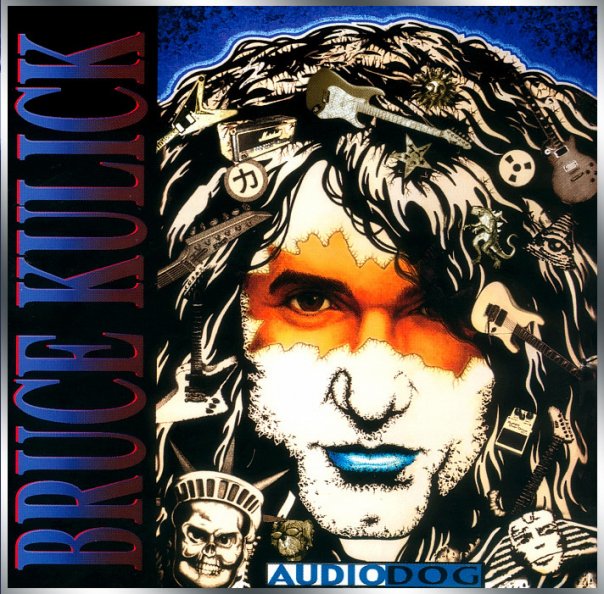
Andrew:
Audio Dog is excellent. I love Transformer, too; I was always such a big fan of “Crazy.” And BK3, what a great record. Your guitar work is just monstrous on that record, especially on side-b.
Bruce:
I spent a lot of time making that record and working on it. And the producer, who I knew quite well, Jeremy Rubolino, had a big vision. It was in between all my travels, and that’s why it took years to finish. But I’m real proud of the record. I did want to mention that I have plans for both Audio Dog and Transformer to come out on vinyl. Just one step at a time. And whenever you’re going to reintroduce or reissue a final product, you need to really have the parts so you can make something relative to what was original. I obviously have the digital files, but we’re talking about the artwork now. So I’m going to work on it, though.
Andrew:
Yeah, those are really great records, and I was going to ask you if you planned to put them out on vinyl. So that’s all great news as far as I’m concerned. The last time we spoke, you touched on the idea that we might see another solo record from you in the future since it’s been a while. Is there anything new on that front?
Bruce:
I really wanted to morph that into more music, new music from the guys that I’d done the KISS Cruises with, Todd Kerns, Brent Fitz, of course, my Union drummer, and Zach Throne, who is a terrific bassist who sings, too. He also does a lot of gigs playing guitar. So he’s a very versatile musician. We’re working on a track now. Brent and Todd got busy doing the Slash record. So we’re definitely going to put out something, I hope, by the end of spring. And we’ve written some originals. We’ve worked on things, but it’s going to be hard to know how much of that I’ll be able to do. This is such an uncertain year. I mean, we have obviously got the vaccine. It seems like the virus isn’t as dangerous, but we don’t know. We don’t know what’s going to happen with live music. And we’re talking about people where a lot of their career is involving gigging and traveling. So, how do you plan a year? So that’s why I am being very aggressive about products, especially things that exist. But I just need to package it. But when it comes to the gigging and what people are going to be available and around for, it’s just this has been a tough one to figure out. And I scratch my head with it because I like to know what’s coming up. But it’s all exciting anyway. It doesn’t matter.
Andrew:
The last thing I want to touch on is obviously Grand Funk Railroad. I interviewed Don [Brewer] a few weeks back, and I got the short version of how he met you in the 80s when he was on tour with Bob Seger, and he basically said, Grand Funk needed a guitar player, and one of the first people he thought of was you. Take me through how you ended up with Grand Funk Railroad.
Bruce:
It really was a case of when you tour with a headliner, you know, maybe that Bob Seeger is hanging out with everybody, but the band’s going to meet the other band, and that’s how we became friends. There’s no doubt I’m still really close with Mark Chatfield, who was one of the two guitar players from that tour. And he lives not far from me here in Vegas. And quite honestly, I was always aware of Don Brewer, and I loved Grand Funk. I was really impressed that I’m on tour and Don’s on tour. And there were a couple of other connections how I knew of him and knew him. But yeah, we all knew each other. And then years later, I remember seeing him at a show, and we got to hang out and chat at one of the restaurants, maybe talking about the ’83 tour with Seger. So, I think, when they got going again, I was on the shortlist, and what can I say? I was available. I went up and did a good job.
I remember the funniest story about joining Grand Funk is that the singer, Max Carl, who’s very talented and not from the Rock world, even though he’s done a lot of session work because he’s such a great singer, he would do things with, you know, I think he might have sung on a Mötley Crüe record when they need gang vocal people, but you don’t get credited and all that. Anyway, Max saw a picture of me with Corabi from Union, with these strippers backstage, and he’s thinking that I’m out of my mind, probably an alcoholic drug user. [Laughs]. And then I remember I got together with them, and all I would talk about is like, “Oh, I just moved my parents out to L.A. It’s so hard, and I’m dealing with my mom.” [Laughs]. So, it was like, “I guess he’s not really that guy from the photo.” [Laughs]. It was a photo-op. You know, it’s Rock ‘N’ Roll backstage. There could be some girls the promoters bring, but it doesn’t define me. So anyway, long story short, Max vetted me after meeting me, and Don offered me the gig. And here we are, 20 years later. I miss those guys. I love them. We play well together, and ironically enough, the pandemic put the brakes on it, you know, and we haven’t done a gig since March 2020; the last gig, I think, was March 6th of last year. Pretty crazy.
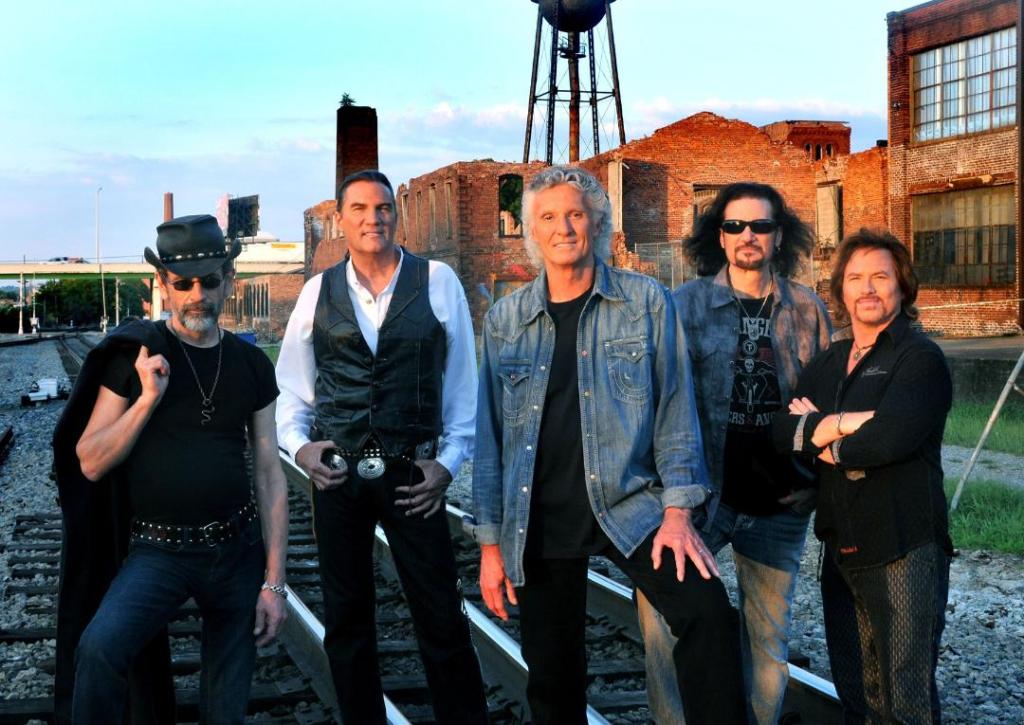
Andrew:
Regarding Grand Funk, I know it’s been a long time since the band has put out a record. You guys are such a tight, stable lineup. Has there ever been any talk of you guys putting out a studio record?
Bruce:
We do some new songs. It’s really completely Don and Mel’s decision n the same way that it wouldn’t matter how much Eric or Tommy in KISS want to do a new record; if Paul and Gene don’t want to do it, then it ain’t going to happen. [Laughs]. Don, for a long time, has just always said, “I like my life like this. I love playing this music. We can have some new songs in the set, but everything’s different, and I don’t really need that in my world. It doesn’t change me. It doesn’t benefit me.” It’s totally their choice, and I have to respect that. I do understand it, especially knowing Mel and Don pretty well after all these years. Would it be, or might it be something emotionally satisfying if they wanted to do it where there would be something interesting? Sure. But I don’t think it’s necessary for what he wants to do in the sense of being able to perform for people, make them happy, make some money and continue the legacy of something called Grand Funk. So, again, it probably is not going to happen, but it’s up to them, and they know I’d be there if they want.
Andrew:
I’ve got one question, and this is a KISS-related question. Regarding the KISS End of the Road Tour, there are all kinds of rumors at the last show in New York City that we’re going to see all kinds of former members of KISS come up. And you probably couldn’t tell me, even if you did know, but I could still ask, is there any chance that we’ll see you play with KISS for a couple of songs during this final tour?
Bruce:
Well, that’s been the narrative from the group, obviously. And obviously, the pandemic really changed all their plans, and everyone else’s, but I would presume, and I don’t know beyond what you know, first of all, we don’t know if it’s changed or when it will happen and all that. But I think if the intention is this is really the last gig, I think they would invite me and I would be performing. But I don’t have any details. And certainly, let’s put it this way, I probably would have known a lot more if it was a normal world without the pandemic. That put everything on pause, but I don’t know anything else.
Andrew:
Whenever that last show is, I definitely plan on being there. And I hope to see you take the stage. That would be pretty awesome.
Bruce:
Yeah. It would be fun. And I’ve still been in touch with the guys, and sometimes they share some of the things I’ve posted. What can I say? I don’t have to be in the band to be part of the family if you know what I mean. So it’s always a win-win for all of us. And I think they really like that. I try to promote so much of my era; the point is, it’s great that we’re all celebrating the history of the band.
Andrew:
So with COVID dying down and a possible light at the end of the tunnel in sight, what’s next for you? What’s realistic? What do you hope can happen if things break right?
Bruce:
Well, I love all the new things I’ve learned, so I’ll continue to want to do videos and engage in some interesting things. During the pandemic, all of a sudden, I’m doing a song with Chris Jericho, you know what I mean? New players and everything. So I like all that. The tribute song with Paul Z for “I Still Love You,” which was dedicated to my brother and their losses, stuff like that. So, I still want to be involved with a lot of things. You know, obviously and probably the biggest thing that will change is, which I don’t know what date yet, but live gigs will happen. There will be live gigs again. So then I get to mix that into everything else that I’m doing. Maybe I could eventually think about my book again. I know I’ve talked to my wife about it. I’d like to do more recording. I’d like to record some things with her. I want to record with the KISS Cruise band. So there are endless possibilities for fun things. I could see myself once KISSwinds down doing things with Eric [Singer] as well. We’ll see. It’s very exciting that everything I’ve been involved with in my era is still valid, and that means there are so many more new opportunities. So what can I say? I’m pretty fortunate that way.
Andrew:
I would love to see some incarnation of Union come back.
Bruce:
That could happen too. I don’t know. But why not? I’m tight with the guys. And if there’s a real positive reaction to a vinyl release, if that’s a real green light. Wonderful.
Andrew:
You know, I’m happy that those records are going to be put out on vinyl, and I’m definitely happy that Audio Dog and Transformer will be too.
Bruce:
Yes, that will take a while. The plants are slow, but it’s all good.
Andrew:
Good things come to those who wait.
Bruce:
Yes!
Andrew:
Ok, Bruce, that’s all I’ve got. I really appreciate you taking the time. It was great to chat with you, and congrats on those Union reissues and all that’s to come.
Bruce:
Thanks! It was great to look back. I should know very soon and hopefully get pen to paper on the deal. So, it’ll be in the pipeline. Stay safe and take care.
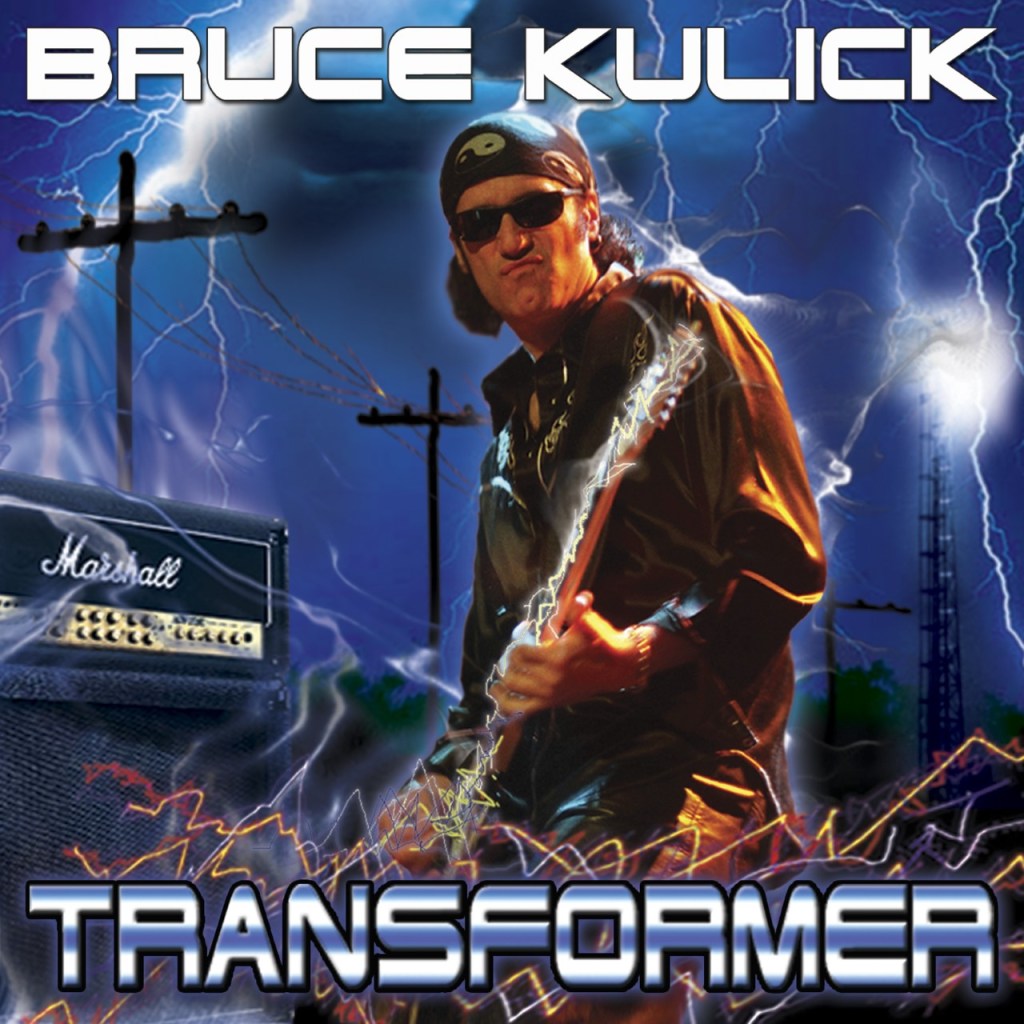
Interested in learning more about the work of Bruce Kulick? Check out the link below:
Be sure to check out the full archives of VWMusic Interviews, by Andrew Daly, here: www.vwmusicrocks.com/interview

2 thoughts on “An Interview with Bruce Kulick”